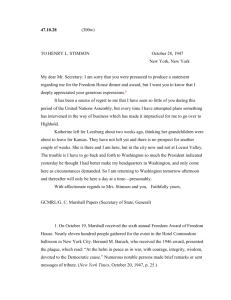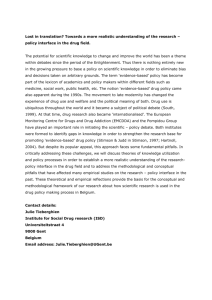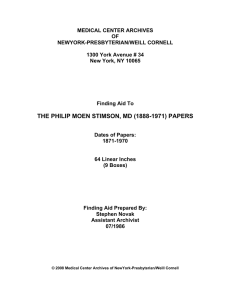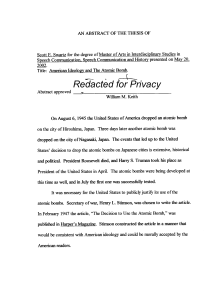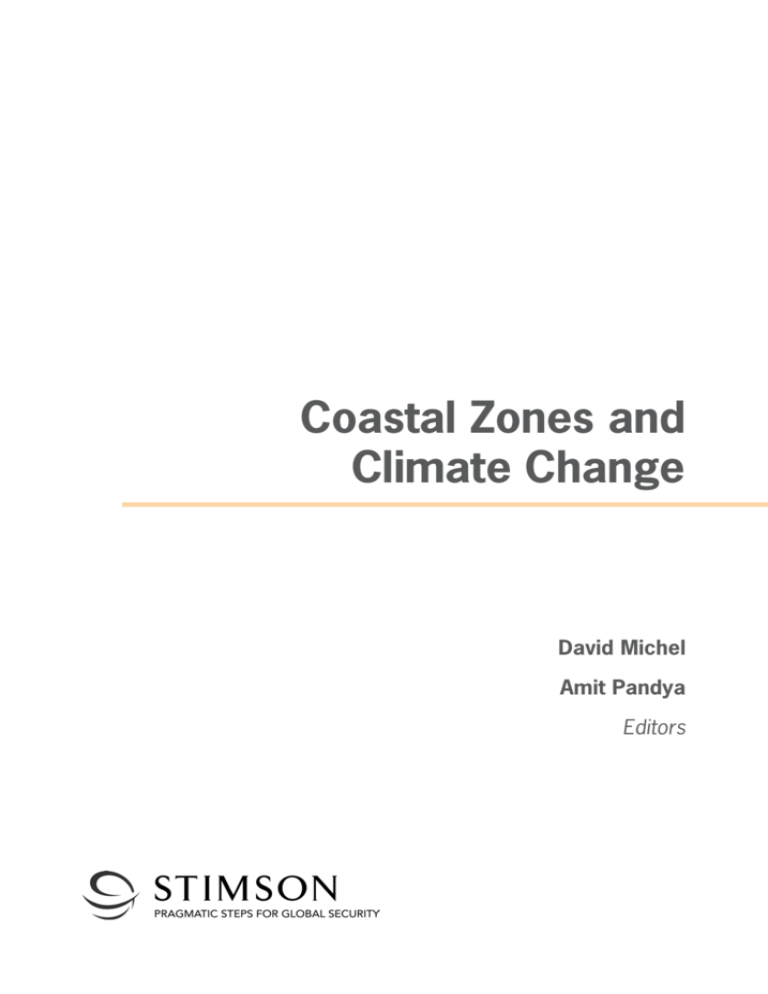
Coastal Zones and
Climate Change
David Michel
Amit Pandya
Editors
Copyright © 2010
The Henry L. Stimson Center
ISBN: 978-0-9821935-5-6
Library of Congress Control Number: 2009939156
Cover photos: iStockphoto
Cover design by Free Range Studios/Updated by Shawn Woodley
Book design/layout by Nita Congress
An electronic version of this publication is available at:
www.stimson.org/rv
All rights reserved. No part of this publication may be reproduced or transmitted in any
form or by any means without prior written consent from
The Henry L. Stimson Center.
The Henry L. Stimson Center
1111 19th Street, NW, 12th Floor
Washington, DC 20036
Telephone: 202.223.5956
Fax: 202.238.9604
www.stimson.org
Contents
Preface...................................................................................................................................v
Acknowledgments.............................................................................................................. vii
Introduction......................................................................................................................... ix
Map of Indian Ocean Region................................................................................................2
Perspectives from the Regions
Impacts of Climate Change on Coastal Ecosystems in the Indian Ocean Region................3
Nirmalie Pallewatta
Climate Change and Sea Level Rise: Issues and Challenges for Coastal Communities in
the Indian Ocean Region............................................................................................17
Golam Rabbani, A. Atiq Rahman, and Nazria Islam
Impacts and Implications of Climate Change for the Coastal Zones of Egypt...................31
Mohamed El Raey
Small Island Developing States: Incubators of Innovative Adaptation and Sustainable
Technologies?.............................................................................................................51
Alain De Comarmond and Rolph Payet
Adaptation Policies in the Coastal Zones of the Indian Ocean Region: Challenges,
Opportunities, and Strategies.....................................................................................69
Poh Poh Wong
Interpreting the Trends
The Policy Challenges: Looking Ahead.............................................................................87
David Michel
Appendix 1: Author Biographies.......................................................................................95
Appendix 2: Experts Consulted.........................................................................................97
Appendix 3: Partner Institutions......................................................................................101
iii The Regional Centre for Strategic Studies (RCSS) is based in
Colombo, Sri Lanka, and is an independent, nonprofit NGO that fosters collaborative research, networking, and interaction on strategic
and international issues pertaining to South Asia. RCSS coordinates
research on strategic and security-related issues; promotes interaction
among scholars and other professionals in and outside the region who
are engaged in South Asian strategic and international studies; and fosters relationships and
collaboration among institutions studying issues related to conflict, conflict resolution, cooperation, stability, and security in South Asia.
The Stimson Center, located in Washington, DC, is a nonprofit, nonpartisan institution devoted to offering practical solutions to problems
of national and international security. Since its establishment in 1989, Stimson has been
committed to meaningful impact, a thorough integration of analysis and outreach, and a
creative and innovative approach to global security challenges. Stimson has three basic
program areas: reducing the threat of weapons of mass destruction, building regional security, and strengthening institutions of international peace and security. These program areas
encompass work on a wide range of issues, from nonproliferation to transnational challenges in Asia, from UN peacekeeping operations to analyzing the resources needed for
21st century statecraft.
Preface
S
timson’s Regional Voices: Transnational Challenges project is devoted to enhancing the information and analysis available to US policymakers about emerging transnational security challenges. The project draws on the knowledge and perspectives of technical and subject experts, and of political and strategic analysts, to develop an ongoing
dialogue among researchers and practitioners from various disciplines and occupational
backgrounds. The geographical range of the project’s work covers East Africa, the Middle
East, South Asia, and Southeast Asia.
Our work includes organizing workshops in the regions, entering into research partnerships
with regional institutions and individuals, carrying out interviews in the field, and conducting research into the state of current knowledge and thought. We have sought the input of
experts and practitioners who constitute new voices in the conversation with the US government. We have not shied away from perspectives that dissent from conventional wisdom, as long as they represent significant bodies of opinions in the countries of the regions.
During 2007, we sought to arrive at an understanding of perspectives specific to each
region. This was reflected in our 2008 publication Transnational Trends: Middle Eastern
and Asian Views. The following year, we engaged in extensive and substantial dialogue and
collaboration across all the regions on themes as varied as the political economy of natural
resources, climate change and river systems, maritime resources and security in the Indian
Ocean, and the relationship between Islam and politics. Each of these resulted in a collection of essays by experts from the regions and from Stimson.
The current volume reflects some of our work in 2009. In addition to the work on climate
change and coastal zones reflected herein, we have undertaken work in the areas of migration and urbanization, maritime security, international climate change policy, water and
conflict, and political stability and internal conflict in South Asia.
We have sought to integrate these varied inquiries by asking the following questions in
each area of research:
v vi | Preface
• How is evolving contemporary public discourse addressing the technical, governance, and cultural challenges of these specialized subject areas?
• How do political structures and cultural traditions constrain or facilitate effective
responses? What examples or opportunities for transnational cooperation do they
offer?
• What scientific, technological, and other intellectual resources are available or necessary, and how effectively are these deployed?
• What are the key relationships among social, economic, environmental, technological,
and political trends? How do these trends relate to traditional security concerns? What
new sources of instability, crisis, or conflict are found in these, and with what consequences?
• What are the social, political, and security consequences of rapid change?
We have sought throughout to maintain a transnational perspective, to look at trends or
threats that transcend national borders, or at those that are national in scope but recur in
many societies in a region. In all our conversations, conferences, meetings, roundtables,
and focus groups, we have attempted to elicit the most candid discussion possible, and
have done so by explicitly placing all conversations off the record and not for attribution.
Each volume in the present series consists of essays on some of these questions by experts
and thinkers from the regions covered, accompanied by one or more essays by Stimson
scholars designed to synthesize and analyze our findings and describe the key trends that
we have noted.
Amit A. Pandya
Director, Regional Voices: Transnational Challenges
Acknowledgments
T
his volume was made possible by the generous contributions of time, energy, and
intellectual analysis of numerous individuals in the United States and abroad. In addition, many people worked in many different capacities behind the scenes to shepherd the
book to publication.
Our partner, the Regional Centre for Strategic Studies (RCSS), based in Colombo, Sri
Lanka, merits special thanks for helping us design and carry out a workshop of international experts in Colombo in March 2009. I am particularly grateful to Amal Jayawardane,
Executive Director of RCSS, Geetha da Silva, Associate Director, and Gayathri Nanayakkara, the Centre’s indefatigable Program Officer, for both their hospitality and intellectual
vigor.
I also wish to express deep appreciation to Stimson President Ellen Laipson, who brought
her insights to bear in cochairing the Colombo conference, and to the meeting participants
and interviewees who provided valuable cross-regional and multidisciplinary perspectives
on the complex issues surrounding coastal zones and climate change. Experts consulted
in preparation for the Colombo workshop and in the research for this volume are listed in
appendix 2.
I am indebted to chapter authors Alain De Comarmond, Mohamed El Raey, Nazria Islam,
Nirmalie Pallewatta, Rolph Payet, Golam Rabbani, A. Atiq Rahman, and Poh Poh Wong for
their commitment to this project, their valuable analytical contributions, and their patience
with the process of publication.
This book owes its existence to the talent and dedication of the Regional Voices team and
others who worked many minor miracles. Corey Sobel, Research Associate on the Regional
Voices project, performed essential roles in the coordination, research, and editorial work
for the volume. Research Associates Kendra Patterson and Jumaina Siddiqui shouldered
much of the effort in organizing the Colombo conference. Director Amit Pandya, who
coedited this volume, provided vision and intellectual leadership. Stimson’s Director for
External Relations, Nancy Langer, played a major part in bringing this volume to completion; as did Alison Yost, who is largely responsible for the production values, and Shawn
vii viii | Acknowledgments
Woodley, who oversaw graphic design. Project interns Andrew Houk and Iranga Kahangama furnished key research support. Our invaluable Contract Analyst, Nicole Zdrojewski,
who manages operations for the entire project, made it all run smoothly. And I owe a special debt of gratitude to Nita Congress and Elizabeth Benedict for their extensive, careful,
and intelligent editorial work above and beyond the call of duty.
Finally, I owe my sincere apologies and thanks to anyone I have inadvertently failed to
acknowledge.
David Michel
Senior Associate, Regional Voices: Transnational Challenges
March 2010

